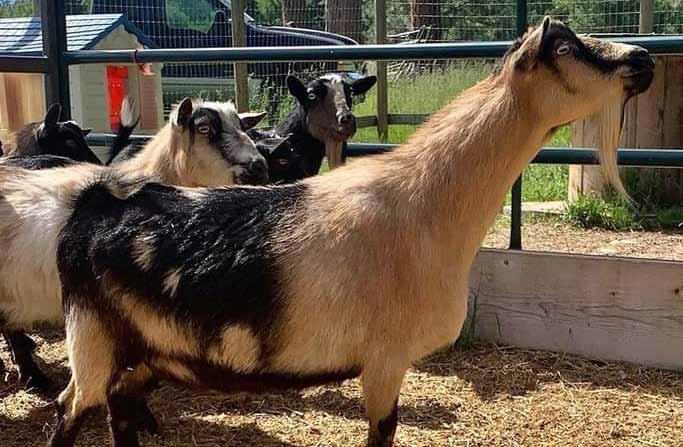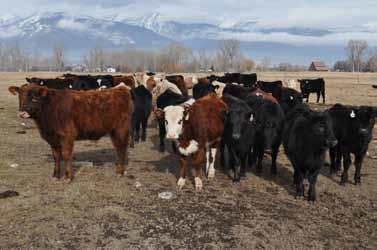
3 minute read
Wether stone formation in goats
Page 6 - Agriculture Magazine, September 2020
photo Rivendell Fa m
Advertisement
Sometimes owners have seen the goats straining like they’re constipated and sometimes they’re just not quite right, maybe not eating like they normally do. These signs can indicate a urethral blockage, wherein stones that have been “growing” in the bladder end up in the urethra and stop urine from being able to pass, causing urine to “backup” and, without any treatment, a fatally ruptured bladder or urethra.
Stone formation not uncommon in male goats
Dr . Magdalena Niederm Associate Veterinarian Burnt Fork Veterinary Clinic eyer ,
One of the worst and unfortunately not uncommon small ruminant emergency calls often starts, “I have a wether (castrated male goat), and he is on his side crying out, and I’m not sure why.”
Sometimes owners have seen the goats straining like they’re constipated and sometimes they’re just not quite right, maybe not eating like they normally do. These signs can indicate a urethral blockage, wherein stones that have been “growing” in the bladder end up in the urethra and stop urine from being able to pass, causing urine to “backup” and, without any treatment, a fatally ruptured bladder or urethra.
The problem with urinary blockages is that even with timely treatment, the prognosis is guarded to poor.
Owners often find themselves facing expensive surgery or euthanasia, and a wether that blocks once is more likely to re-obstruct. With
that bleak backdrop in mind, I want to offer wether owners some management options to save you from ever having to make that call.
Of course, medicine is never black and white; however, we know there are several things that contribute
To the formation of stones and urethral blockages. By considering these contributors to stone formation, we can try to manage diet/ husbandry to try and avoid ever having to deal with the aforementioned emergency call. 1) Obesity and a high “concentrate”/grain diet are big risk factors for the formation of urinary stones. A diet with a lot of grain in it can predispose the bladder to having a basic (high pH) environment because of a high phosphorus:alcium ratio. This allows certain types of stones known as struvites/calcium phosphates to form. If you have a wether, the reality is that a grass hay (and a free choice loose mineral/salt block combination) is usually enough for them, and they do not need the supplemental calories offered by grain or high carb treats. If you enjoy the bonding spent feeding your goat treats/a pellet (which is fair), you can use a 100% grass hay pellet, or occasional less sugary/starchy fruits/veggies as treats in moderation. 2) However, it is important to have forage (hay/grass) available free choice, as feeding hay in meals instead of free choice may increase the risk of urine stone formation. Free choice water also allows wethers to remain hydrated, which is imperative to reducing the risk of stone formation. 3) While a high phosphorous: calcium ratio can increase the risk of stones, the opposite is also true. High calcium (and low phosphorous/ magnesium) diets like lush rapidly growing clover pictures or alfalfa hay can predispose ruminants to different types of stones, including calcium carbonate/calcium oxalate stones. 4) Early castration (like banding at an early age) and castration in general, may potentially cause decreased adult urethral diameter. For
Agriculture Magazine, September 2020 - Page 7

this reason, if you are planning on keeping your wethers solely as pets, you may want to consider surgically castrating at 3-4 months old, to allow longer “testosterone exposure,” especially in Nigerian dwarfs or pygmy goats, who are smaller in stature to begin with. 5) Wethers’ urine pH goal is ideally 5.5-6.5. It is possible to measure your wether’s pH with “pool pH paper” and if you do notice that the pH is too high (>7), you can talk to your veterinarian about possible treatments.
None of these recommendations can guarantee that your wether will never have a urolith (urinary stone) issue. If you ever notice straining/pain/dribbling/inappetence, and do not observe urination, contact a veterinarian, as a urinary stone is a medical emergency. However, feeding your wether free choice grass hay and avoiding grains, while offering free choice water and minerals will help decrease the risk of being faced with this devastating emergency.









